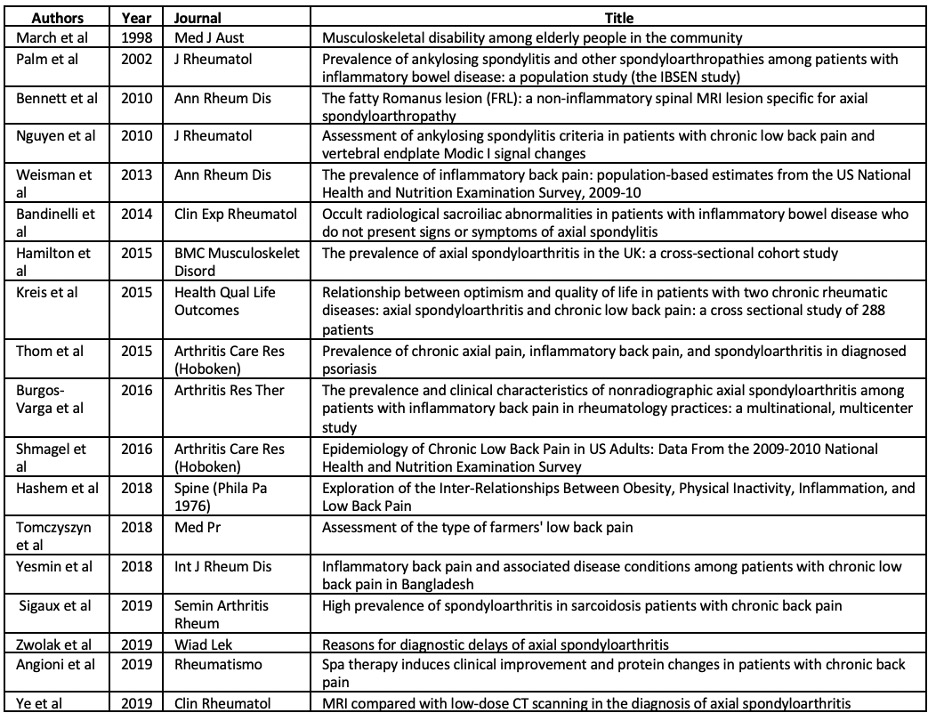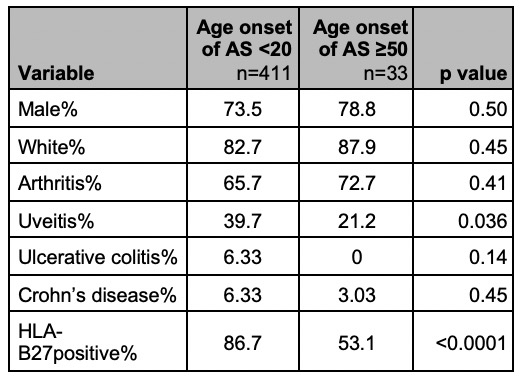Session Information
Session Type: Poster Session B
Session Time: 9:00AM-11:00AM
Background/Purpose: Chronic back pain (CBP) is a common musculoskeletal complaint and a significant cause of disability (Weisman et al., 2013). A subset of CBP, chronic inflammatory back pain (CIBP) occurs in about one third of CBP patients in the NHANES 2009-2019 survey, especially in younger individuals (Weisman et al., 2013). For older individuals, there is little known about CIBP. Although older age is not an exclusion factor in many criteria for inflammatory back pain (IBP) (Weisman, 2012), it is generally thought IBP begins in patients less than 45 years old. Thus, we endeavored to review CIBP in individuals 50 years and older by i) a systematic literature review, ii) evaluating prevalence using National Health and Nutrition Examination (NHANES) data from the 2009-2010 survey, and iii) reporting clinical features of late onset ankylosing spondylitis (AS) from a longitudinal AS cohort.
Methods: The design of the present analysis was based on a systematic literature review using “chronic inflammatory back pain” and “chronic low back pain” as search terms to identify articles of interest between January 1, 2013, and March 1, 2020. The search was restricted to articles about human subjects, in English, and including subjects >65 years of age. The data from the arthritis questionnaire in the 50-59 age group of the 2009-2010 NHANES were analyzed using the Berlin 7b criteria looking at prevalence of CIBP. Lastly, the clinical features of AS patients in the Prospective Study of Outcomes in AS (PSOAS)/Australo-Anglo-American Spondyloarthritis Cohorts (TASC) were examined comparing patients with age of onset less than 20 years old to those 50 years and older, using Chi-square test to look at significance.
Results: Using the search term “chronic inflammatory back pain,” the literature search identified 1,203 articles. The second search using “chronic low back pain” identified 2,245 articles. Eighteen articles were included in the review that met search criteria for CIBP in the elderly. Fifteen articles were cross-sectional studies, one was case-control, one longitudinal, and one was a randomized trial (Table 1). In NHANES 2009-2010, 55 (2.9%) subjects otherwise met Berlin criteria for CIBP but that started over the age of 50 years (Figure 1). Of the 1,253 patients in the PSOAS cohort, 33 (2.6%) had disease onset > 50 years old. There was markedly lower frequency of HLA-B27 and lower frequency of uveitis with late onset disease (Table 2).
Conclusion: In a systematic review of articles about CIBP, we found a wide range of studies on chronic back pain from different specialties: rheumatology, pain management, orthopedic surgery, neurosurgery, chiropractic, imaging, and general medicine. However, there was not one article addressing CIBP in the older population. Based on the NHANES data, if the age restriction is omitted, nearly 3% of the population has chronic inflammatory back pain commencing on or after the age of 50 years. Moreover, from the PSOAS/TASC data, one in 40 AS patients may have disease onset after age 50. These are unmet needs for this population group, for non-rheumatologists to identify at-risk patients and refer appropriately, and for rheumatologists to consider as an important clinical entity.
 Figure 1: Late Onset “Chronic Inflammatory Back Pain” in NHANES 2009-2010
Figure 1: Late Onset “Chronic Inflammatory Back Pain” in NHANES 2009-2010
 Table 1: Results of Systematic Review
Table 1: Results of Systematic Review
 Table 2: Characteristics of Late Onset AS from 1253 Patients in the PSOAS Cohort
Table 2: Characteristics of Late Onset AS from 1253 Patients in the PSOAS Cohort
To cite this abstract in AMA style:
Ridley L, Rianon N, Hwang M, Lee M, Gensler L, Ward M, Brown M, Tahanan A, Rahbar M, Ishimori M, Weisman M, Reveille J. Chronic Inflammatory Back Pain Occurring Later in Life: A Neglected Concept [abstract]. Arthritis Rheumatol. 2020; 72 (suppl 10). https://acrabstracts.org/abstract/chronic-inflammatory-back-pain-occurring-later-in-life-a-neglected-concept/. Accessed .« Back to ACR Convergence 2020
ACR Meeting Abstracts - https://acrabstracts.org/abstract/chronic-inflammatory-back-pain-occurring-later-in-life-a-neglected-concept/
